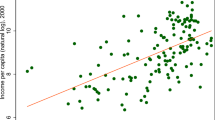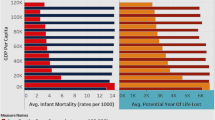Abstract
In a test of the minority group status hypothesis, this study examines the effect of intergenerational educational mobility on the fertility of black and white women. Regression analysis of data from the National Survey of Family Growth provides only limited support for the hypothesis that upwardly mobile black women have lower fertility than their white counterparts. The main finding is that the parity of upwardly mobile black women is influenced more strongly by educational origins (parents' education) than is the parity of upwardly mobile white women. Thus, future studies should consider the effects of social origins on racial differences in fertility.
Similar content being viewed by others
References
Bachrach, C., Horn, M., Mosher, W. & Shimizu, I. (1985).National survey of family growth, cycle III. Hyattsville, MD: National Center for Health Statistics. Vital and health statistics, series 2, number 98.
Bean, F.D. & Marcum, J.P. (1978). Differential fertility and the minority group status hypothesis: an assessment and review, pp. 189–211, in: F.D. Bean & W.P. Frisbie (eds.),The demography of racial and ethnic groups. New York: Academic Press.
Bean, F.D. & Swicegood, C.G. (1979). Intergenerational occupational mobility and fertility: a reassessment,American Sociological Review 44: 608–619.
Blau, P.M. & Duncan, O.D. (1967).The American occupational structure. New York: John Wiley.
Boyd, M. (1973). Occupational mobility and fertility in metropolitan Latin America,Demography 10: 1–17.
Duncan, O.D. (1966). Methodological issues in the analysis of social mobility, pp. 51–97, in: N. Smelser & S.M. Lipset (eds.),Social structure and economic development. Chicago: Aldine.
Farley, R. (1970).Growth of the black population. Chicago: Markham.
Goldscheider, C. & Uhlenberg, P.R. (1969). Minority group status and fertility,American Journal of Sociology 74: 361–372.
Johnson, N.E. (1979). Minority-group status and fertility: A new look,American Journal of Sociology 84: 1386–1400.
Kasarda, J.D., Billy, J.O.G. & West, K. (1986).Status enhancement and fertility. Orlando, FL: Academic Press.
Marcum, J.P. & Bean, F.D. (1976). Minority group status as a factor in the relationship between mobility and fertility: the Mexican American case,Social Forces 55: 135–148.
Poston, D.L. (1974). Income and childlessness in the United States: Is the relationship always inverse?,Social Biology 21: 296–307.
Ritchey, P.N. (1975). The effect of minority group status on fertility: A reexamination of concepts,Population Studies 29: 249–257.
Rosenfeld, R.A. (1978). Women's intergenerational occupational mobility,American Sociological Review 43: 35–46.
St. John, C. & Grasmick, H.G. (1985). Decomposing the black/white fertility differential,Social Science Quarterly 66: 132–146.
Sly, D.F. (1970). Minority-group status and fertility: An extension of Goldscheider and Uhlenberg,American Journal of Sociology 76: 443–459.
Stevens, G. & Boyd, M. (1980). The importance of mother: Labor force participation and intergenerational mobility of women,Social Forces 59: 187–199.
Author information
Authors and Affiliations
Rights and permissions
About this article
Cite this article
Boyd, R.L. Educational mobility and the fertility of black and white women. Popul Res Policy Rev 13, 275–281 (1994). https://doi.org/10.1007/BF01074338
Issue Date:
DOI: https://doi.org/10.1007/BF01074338




